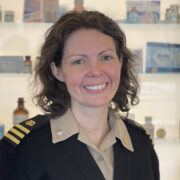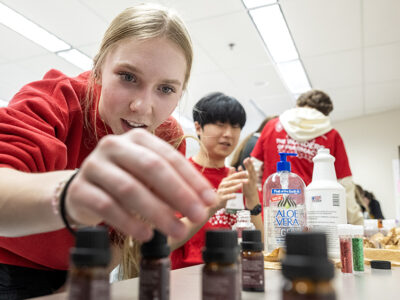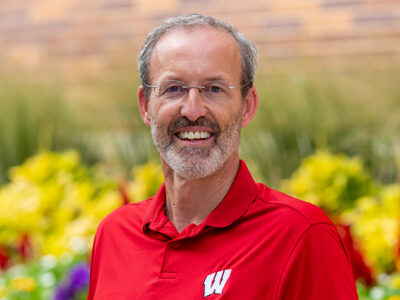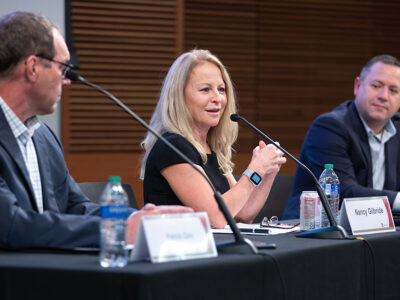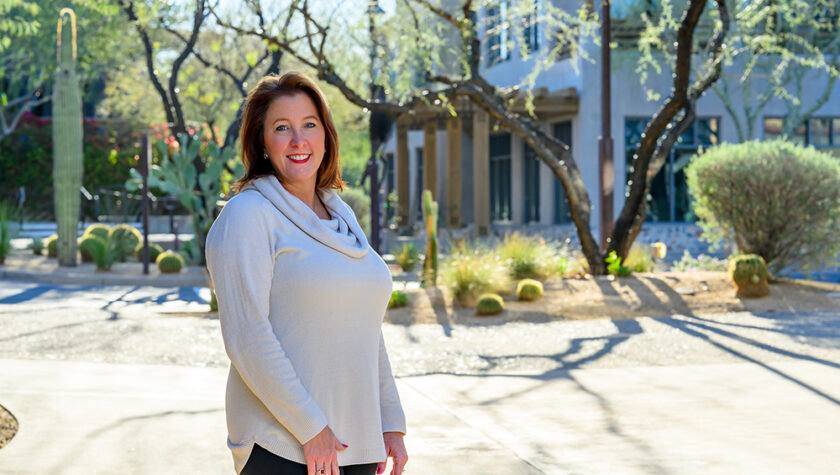
8
March

Focused on patient care, Joanne Palermo’s pharmacy career has spanned zoology to pharmacy, Wisconsin to Arizona, and retail to telehealth
By Katie Ginder-Vogel
Armed with a degree in zoology, Joanne Palermo (BS ‘98) spent six months working as a research specialist at the University of Wisconsin–Madison School of Veterinary Medicine. She then spent almost five years creating animal models of diabetes to contribute to research on the prevention and treatment of diabetic retinopathy for the UW Department of Ophthalmology and Visual Sciences (DOVS).
But then she came to a fork in the road: Continue along the research route and pursue a PhD, or perhaps follow up on her interest in health and patient care.
As it turned out, Palermo was just one course away from completing her prerequisites for pharmacy school. A former premed major, Palermo appreciated that she would still get to contribute to direct patient care, while having a flexible work-life balance.
“We picture pharmacists in white coats behind benches, but there’s so much more,” she says. “There are so many things we can do because we have the knowledge, experience, and compassion.”
Finding ‘home’ in Arizona
After following the Badgers to Tucson, Ariz., for a football game, Palermo decided Arizona was her next home. She visited job fairs to see which companies might be hiring pharmacists and got licensed in Wisconsin and Arizona. Ultimately, Palermo joined Walgreens in Arizona, who paid for her move.
“I graduated, threw everything in a truck, headed to Arizona, and didn’t look back,” she says. “I moved Labor Day weekend, and it was 117 degrees and 23 percent humidity. Everyone kept saying how humid it was, but I was parched!”
Palermo worked at Walgreens from 1998 until 2000, a time when the U.S. was facing a serious pharmacist shortage. She and other recent pharmacy graduates would compete for overtime and extra pay.
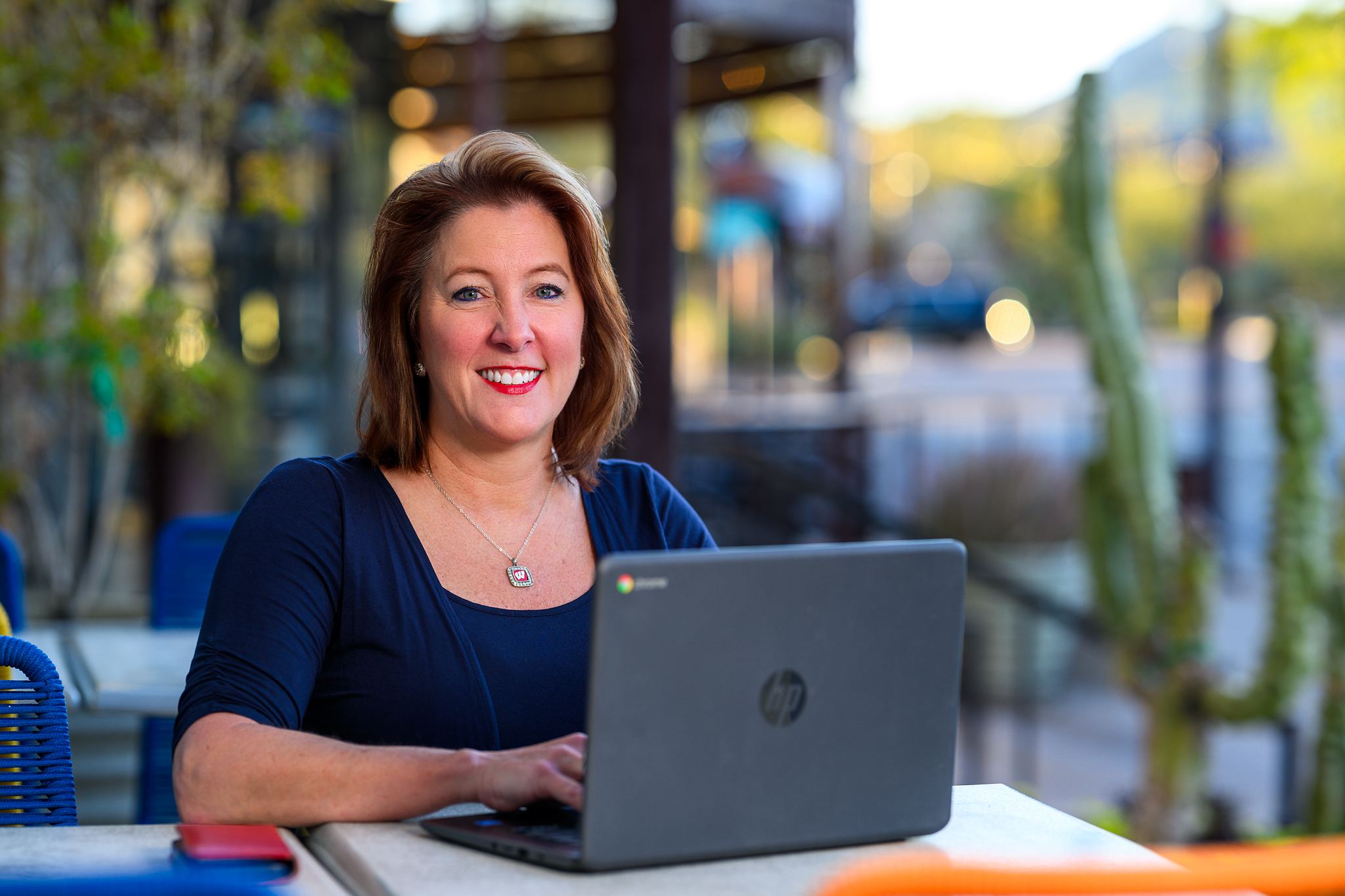
“Things were crazy. They had to close some stores due to low staff,” she recalls. “One pay period, I had 80 hours of regular time and 101 hours of overtime. I bought a house with my overtime pay.”
Palermo switched to a role at Fry’s Food and Drug for over two years, working a seven days on, seven days off schedule of mainly overnights.
“That’s when I started to travel,” she says. “My sister was living in London with a new baby, so I would visit monthly, from Wednesday morning to Tuesday evening. I also went to Paris and Brussels, and because I’m a crazy sports person, I went to every baseball stadium in the U.S. with friends.”
After a few years working nights, Palermo was ready to get back to being a “day person.” She was one of the first pharmacists hired by CVS when the company opened stores in Arizona, and she opened and managed the second CVS store in the state.
“It became CVS’s busiest store,” she says. “I was the CVS pharmacy manager for two years, and it was like my family.”
She was pulled out of that store to become a conversion trainer, converting the pharmacies CVS had acquired into CVS-branded stores.
“We picture pharmacists in white coats behind benches, but there’s so much more.”
—Joanne Palermo
“I got to go convert stores in Florida and Louisiana. I’d stay two weeks, come home for two days, and then go to the next new area of stores,” Palermo says. “I won the CVS Paragon award — the top district and region award.”
Then she was offered a promotion to district pharmacy supervisor, managing 20 stores in a growing district. In this time, Palermo got married, and on her first day back from maternity leave with her first child, CVS announced its acquisition of Osco. The CVS team was expected to spend a week in Rhode Island, but Palermo had a new baby and a firefighter husband who worked 24-hour shifts.
She decided it was time to step back and manage just one store, a few minutes from her house, which gave her more time to be with family. Palermo was soon invited to become a preceptor and adjunct faculty member at Midwestern University in Glendale, Ariz., where she taught from 2012 to 2015.
Then, through a connection at Humana, she was called to start a new journey with patient care.
Telehealth clinical pharmacist
Palermo joined Humana as a clinical pharmacist in their call center, which made her a bit apprehensive until she realized the close connections she could still build with her patients, even over the phone. On the clinical services team, Palermo takes calls handed off by pharmacy technicians. Patients call to talk about side effects, medication costs, or drug interactions.
“I can take the time to really talk with patients. It’s a totally different type of practice,” says Palermo. “It’s actual patient care, where you can talk to someone, listen to someone, and find out what their actual concern is. Through our computer system, can see that whole picture, which makes it so much easier to be more effective and efficient.”
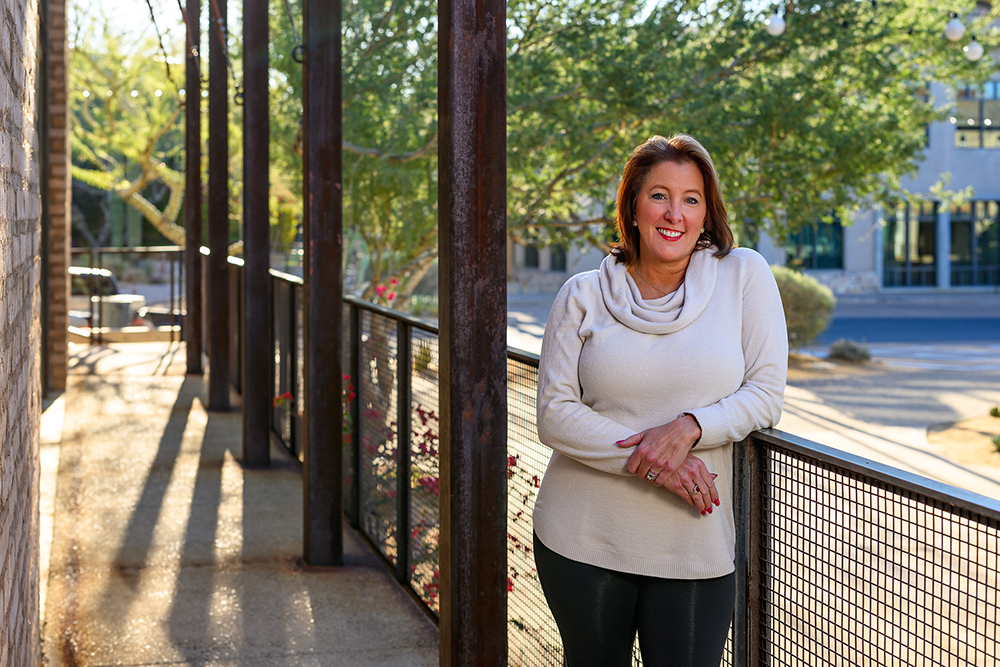
Palermo has spent the past seven and a half years at Humana, which serves Medicare members across the U.S., with over 100 clinical pharmacists providing telehealth services in Arizona, Texas, Ohio, and Florida. She’s been pleasantly surprised by the impact she’s been able to make on patients whom she’s never even met.
“My initial apprehension about going from retail to a call center was that I like my people — my patients become friends,” Palermo says. “Now, having more time and privacy to talk with patients, I’ve developed those relationships — people ask to talk to me again and tell me I’ve made a difference.”
Even before the COVID-19 pandemic, Humana allowed employees to work remotely to see if it was a fit for them, and enough employees enjoyed it that many of them became remote employees even before the pandemic shutdown. Palermo, too, now works at home full-time.
“I love the staff, and we have weekly huddles with and without cameras, and we use instant messaging to chat in real time,” Palermo says. “Plane trips that could have been emails are eliminated. My work-life balance is so good.”
Palermo appreciates the change inherent in her role and new opportunities to learn. For the last six months, she has helped Humana’s clinical programs department with medical reconciliation, known as a med rec. When patients are discharged from the hospital, a pharmacist spends 30 minutes with a patient to do a med rec, reviewing the list of the medications they’ve been prescribed, what they have at home, and what they are actually taking. The pharmacist might find that a patient is missing a medication, has duplicate or incompatible medication, or is struggling with basic needs at home.
“There are so many things we can do because we have the knowledge, experience, and compassion.”
—Joanne Palermo
“We send information to the doctor and nurse care manager at the hospital for urgent missing medications,” says Palermo. “We also make care referrals for people who can’t pay for things like heat at home. I really enjoyed it; it was a reawakening of clinical parts of my brain.”
‘Midwest’ at heart
When Palermo reflects upon her career, she takes pride in her consistent hard work.
“When I first came to Arizona and was trying to keep my head above water at Walgreens, the store manager asked where I was from, and I said, ‘Wisconsin–I just moved here two weeks ago,’” she recalls. “He said, ‘I can tell. It’s that Midwest work ethic.’”
Although she’s now been in Arizona for more than 25 years, she carries that work ethic with her — a carry-over from her Badger days.
“I’m going to go in and do my best, every single day, and I’ve been recognized for doing consistently good work in every role at every company,” Palermo says. “I’m proud of showing up every day, being consistent, doing good work, and getting recognized by peers and patients — which is even more rewarding.”





